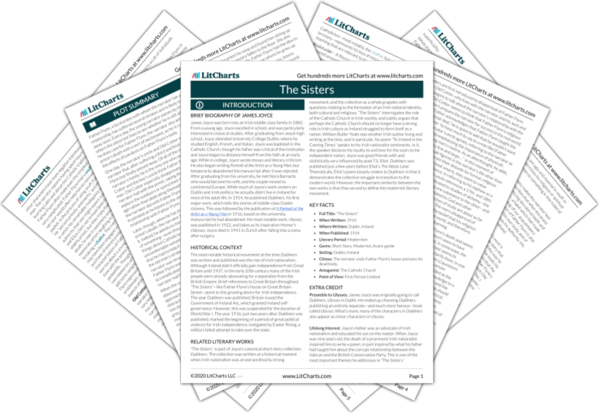The Narrator Quotes in The Sisters
Every night as I gazed up at the window I said softly to myself the word paralysis. It had always sounded strangely in my ears, like the word gnomon in the Euclid and the word simony in the Catechism. But now it sounded to me like the name of some maleficent and sinful being. It filled me with fear, and yet I longed to be nearer to it and to look upon its deadly work.
“No, I wouldn’t say he was exactly…but there was something queer…there was something uncanny about him. I’ll tell you my opinion…”
“Let him learn to box his corner. That’s what I’m always saying to that Rosicrucian there: take exercise. Why, when I was a nipper every morning of my life I had a cold bath, winter and summer. And that’s what stands to me now. Education is all very fine and large…”
“Though I was angry with old Cotter for alluding to me as a child I puzzled my head to extract the meaning from his unfinished sentences. In the dark of my room I imagined that I saw again the heavy grey face of the paralytic. I drew the blankets over my head and tried to think of Christmas.”
“But the grey face still followed me […] It began to confess to me in a murmuring voice and I wondered why it smiled continually and why the lips were so moist with spittle. But then I remembered that it had died of paralysis and I felt that I too was smiling feebly as if to absolve the simoniac of his sin.”
“It may have been these constant showers of snuff which gave his ancient priestly garments their green faded look for the red handkerchief, blackened, as it always was, with the snuff-stains of the week, with which he tried to brush away the fallen grains, was quite inefficacious.”
“I found it strange that neither I nor the day seemed in a mourning mood and I felt even annoyed at discovering myself in a sensation of freedom as if I had been freed from something by his death.”
“I was not surprised when he told me that the fathers of the Church had written books as thick as the Post Office Dictionary and as closely printed as the law notices in the newspaper.”
“There he lay, solemn and copious, vested as for the altar, his large hand loosely retaining a chalice. His face was very truculent, grey and massive, with black cavernous nostrils and circled by a scanty white fur. There was a heavy odor in the room—the flowers.”

The Narrator Quotes in The Sisters
Every night as I gazed up at the window I said softly to myself the word paralysis. It had always sounded strangely in my ears, like the word gnomon in the Euclid and the word simony in the Catechism. But now it sounded to me like the name of some maleficent and sinful being. It filled me with fear, and yet I longed to be nearer to it and to look upon its deadly work.
“No, I wouldn’t say he was exactly…but there was something queer…there was something uncanny about him. I’ll tell you my opinion…”
“Let him learn to box his corner. That’s what I’m always saying to that Rosicrucian there: take exercise. Why, when I was a nipper every morning of my life I had a cold bath, winter and summer. And that’s what stands to me now. Education is all very fine and large…”
“Though I was angry with old Cotter for alluding to me as a child I puzzled my head to extract the meaning from his unfinished sentences. In the dark of my room I imagined that I saw again the heavy grey face of the paralytic. I drew the blankets over my head and tried to think of Christmas.”
“But the grey face still followed me […] It began to confess to me in a murmuring voice and I wondered why it smiled continually and why the lips were so moist with spittle. But then I remembered that it had died of paralysis and I felt that I too was smiling feebly as if to absolve the simoniac of his sin.”
“It may have been these constant showers of snuff which gave his ancient priestly garments their green faded look for the red handkerchief, blackened, as it always was, with the snuff-stains of the week, with which he tried to brush away the fallen grains, was quite inefficacious.”
“I found it strange that neither I nor the day seemed in a mourning mood and I felt even annoyed at discovering myself in a sensation of freedom as if I had been freed from something by his death.”
“I was not surprised when he told me that the fathers of the Church had written books as thick as the Post Office Dictionary and as closely printed as the law notices in the newspaper.”
“There he lay, solemn and copious, vested as for the altar, his large hand loosely retaining a chalice. His face was very truculent, grey and massive, with black cavernous nostrils and circled by a scanty white fur. There was a heavy odor in the room—the flowers.”











